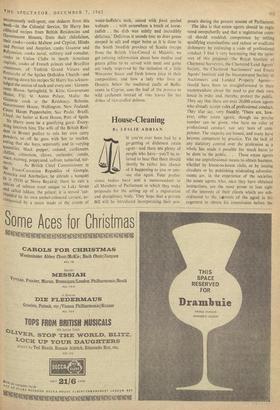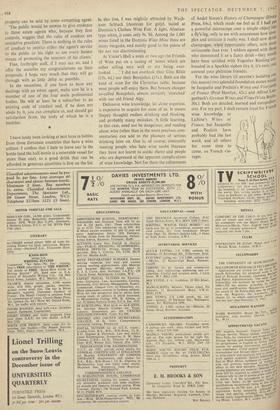House-Cleaning
LESLIE ADRIAN
posals during the present session of Parliament.
The idea is that estate agents should be regis- tered compulsorily and that a registration coun- cil should establish competence by setting qualifying examinations and reduce or eradicate dishonesty by enforcing a code of professional conduct. I find it very heartening that the spon- sors of this proposal—the Royal Institute of Chartered Surveyors, the Chartered Land Agents' Society, the Chartered Auctioneers' and Estate Agents' Institute and the Incorporated Society of Auctioneers and Landed Property Agents— should have been so straightforward in their memorandum about the need to put their own house in order and. thereby, protect the public. They say that there are over 20,000 estate agents who already accept rules of professional conduct. They also say, very frankly, 'There are, how- ever, other estate agents, though no precise number can be given, who have no rules of professional conduct, nor any tests of com- petence. The majority are honest, and many have become competent by practice. Yet the lack of any statutory control over the profession as a whole has made it possible for much harm to be done to the public. . . . Those estate agents Who use unprofessional means to obtain business, whether by house-to-house visits, or by issuing circulars or by publishing misleading advertise- ments are, in the experience of the societies. the estate agents who, once they have obtained instructions, are the most prone to lose sight of the interests of their clients which are sub- ordinated to the irjerests of the agent in his eagerness to obtain his commission before the
property can be sold by some competing agent.
`The public would be unwise to give credence to those estate agents who, because they fear controls, suggest that the rules of conduct are restrictive practices. There is nothing in the rules of conduct to restrict either the agent's service to the public or his right to use every honest means of promoting the interests of his clients.'
Fine, forthright stuff, if 1 may say so, and I offer the societies my congratulations on their proposals. I hope very much that they will go through with as little delay as possible.
In the meantime, if you have to have any dealings with an estate agent, make sure he is a member of one of the four main professional bodies. He will at least be a subscriber to an existing code of conduct and, if he does not abide by it, you can complain to, and should get satisfaction from, the body of which he is a member.
I have lately been looking at best buys in bottles from those fortunate countries that have a wine culture. I confess that I hate to leave any in the bottle (and the half-bottle is a miserable vessel for more than one), so a good drink that can be afforded in generous quantities is first on the list.
In this line, I was mightily attracted by Wach- auer Schluck (Austrian for gulp), tasted at . Dominic's Chelsea Wine Fair. A light, Alsatian- type white, it costs only 9s. 9d. Among the 1,001 wines listed in the Dominic Wine Mine there are many bargains, and mostly good to the palate of the not too discriminating.
At Vinter's Hall a week or two ago the Friends of Wine put on a tasting of 'wines which are either selling very well or are being over- looked. . . I did not overlook their Cote Rotie (13s. 6d.) nor their Beaujolais (11s.). Both are the kind of wine for the Christmas table, because most people will enjoy them. But beware cheaper so-called Beaujolais, almost certainly 'stretched' with our old friend Algy.
Defensive wine knowledge, let alone expertise, is expensive to acquire for most of us. It means (happy thought) endless drinking and thinking, and probably many mistakes. A little learning, in this case, need not be dangerous, and reading about wine (other than in the more precious com- mentaries) can add to the pleasure of serious drinking later on. One is, of course, constantly meeting people who hate wine snobs (because they have not learnt to outdo them) and people who are depressed at the apparent complications of wine knowledge. Not for them the refinements
of Andre Simon's History of Champagne (EbutY Press, 84s.), which made me feel as if I had put a powerful microscope over a simple object like a fly's leg, only to see with amazement how conk plex and intricate it really was. I shall now drink champagne, when opportunity offers, with more seriousness than ever. I seldom agreed with those who denounced it as a fancy drink-they would have been satisfied with Yugoslav Riesling .car• bonated in a Sparklet siphon (try it, it's easy, and astound your philistine friends).







































 Previous page
Previous page